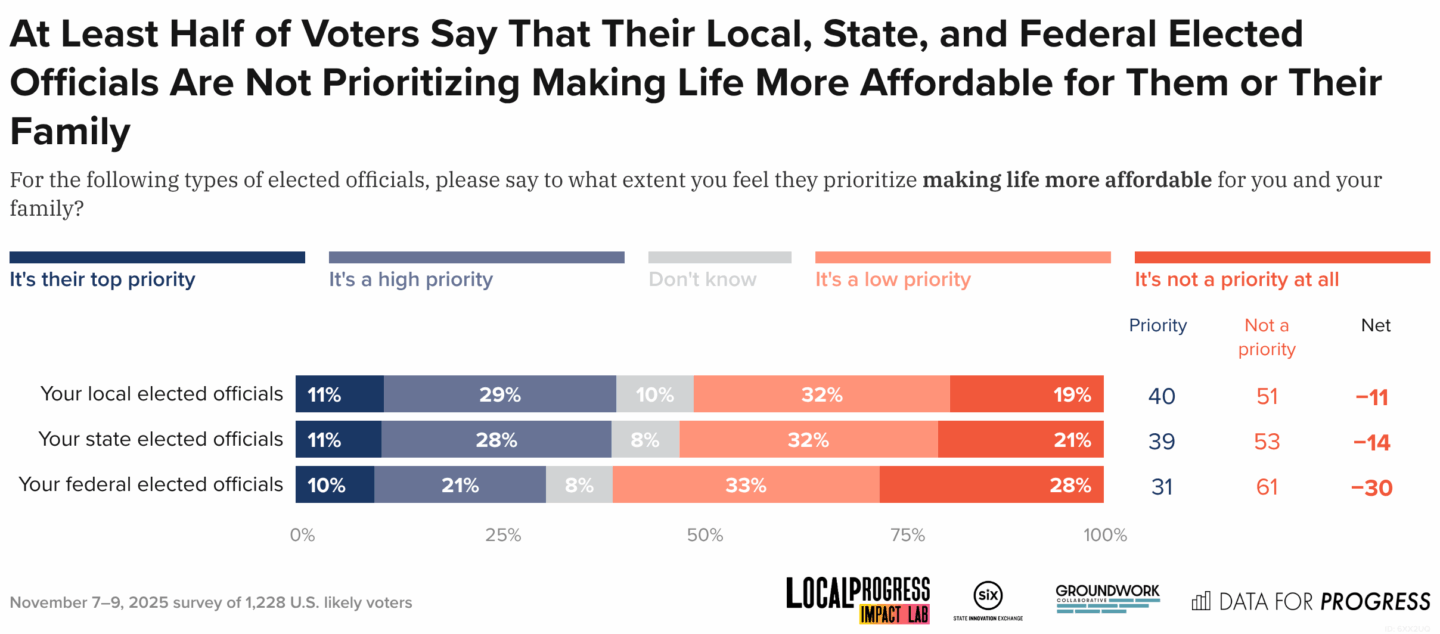Groundwork Collaborative, Local Progress Impact Lab, and State Innovation Exchange release a policy agenda with 10 recommendations on how elected officials can bring costs down
Washington, D.C. – Today, three organizations – Groundwork Collaborative, Local Progress Impact Lab, and State Innovation Exchange – are releasing “Affordability for All: An Agenda to Bring Down Costs for Working Families,” a resource recommending 10 specific policies that elected officials can pass to make people’s lives more affordable.
In the wake of progressive victories like those of Zohran Mamdani in New York City, Katie Wilson in Seattle, and Mikie Sherrill in New Jersey who championed policies like rent freezes, utility bill freezes, and public grocery stores, it is not just necessary, but popular for elected officials to advocate for economic populist policies. According to new polling released alongside the report from Data for Progress, seven in ten voters – including an overwhelming majority of conservatives and independents – report that necessities like housing, groceries, utilities, and health care are getting less affordable for them. At least half of voters believe that their elected officials at all levels of government are not prioritizing affordability and 81% of voters report that they would be more likely to support a candidate working to make life more affordable for working families. Americans are consistently concerned with the economy and overwhelmingly say that inflation is getting worse for them.

The report states:
“Voters across the country are sending a clear message: They demand and expect leaders who will take real action to make life more affordable. The rising cost of basic essentials has left millions of families struggling to just get by, while corporate profits soar and policymakers in Washington fan the flames with reckless tariffs and cruel cuts to life-saving public programs. But state and local officials have an opportunity to chart a different course – one that puts working people first by enacting bold, popular, and proven ideas to bring down prices.”
Essentials like grocery prices, utility bills, and rent have increased by roughly 30% since 2020, outpacing wage growth. Workers and families are bearing the brunt of these price increases, and are forced to make impossible choices, like skipping meals, rationing necessary prescription drugs, or working multiple jobs just to survive. Despite promises to bring down the cost of living, the Trump administration has been raiding SNAP and Medicaid to further enrich its billionaire allies. State and local electeds have been working alongside tenants, workers, and consumers, to pass policies that bring costs down, and Affordability for All lays out a specific agenda that legislators can adopt to reduce the burden on working people’s budgets. The resource includes information on rent caps, surveillance pricing bans, utility rate caps, and more.
Additional Comments:
SIX member Minnesota State House Representative Emma Greenman, who championed Minnesota’s junk fee ban:
“This is a simple bill. Just tell people what something costs, but the impact has been enormous. It’s probably the most popular law that I have ever passed. I still hear about it all the time. People send me their receipts, they send thank you for just knowing what something costs when you’re paying for it… it’s long past due… banning junk fees, getting rid of these exploitative practices, and put the power back in the hands of Americans and Minnesotans, who just want the power to afford their lives.”
SIX member Ohio Representative Munira Abdullahi, who has introduced the Junk Fee Elimination Act:
“In my district and across Ohio, families are doing everything right, and they’re still feeling squeezed from every direction, and they’re tired of being tricked, trapped, and taxed by hidden fees. And junk fees are not just a small inconvenience, again, they’re a systemic extraction from working families. Whether it’s utility bills, rental applications, ticketing platforms, or baking services, hidden charges are designed to confuse consumers and quietly drain their wallets.”
SIX member New York Assemblymember Linda B. Rosenthal, who championed New York’s recently enacted ban on AI-powered rental price fixing:
“My legislation was signed into law last month. It not only prohibits landlords from using rent-setting algorithms, it also updates our state’s antiquated Donnelly Act, which is New York State’s antitrust law, and that’s modeled on the federal Sherman Act. by making it easier for the Attorney General to investigate and prosecute collusion through artificial intelligence…. RealPage tactics have real-life consequences on people who are struggling to get by. Renters across the U.S. spent an extra $3.8 billion in 2023 because of price-fixing algorithms.”
Local Progress member Philadelphia City Councilmember Nicolas O’Rourke, who championed Philly’s ban on AI-powered rental price fixing and the “Affordable Philly Now” initiative:
“In Philly, nearly half of renters spend 35% or more of their income on housing costs and I’m proud to say that Philly was the second city in the nation to ban algorithmic rental price fixing through a bill that my office introduced. My office is also spearheading an initiative called Affordable Philly Now to get our people what they need. The issue at the core of this toolkit and these polices is that unchecked, increasing corporate power is driving a cost of living crisis and my top priority is making sure Philadelphians can afford this city.”
Elizabeth Pancotti, Managing Director of Policy and Advocacy, and co-author of the report:
“Working families across the country are being squeezed from every direction – at the grocery store, the pharmacy, and the power meter. President Trump promised relief, and instead he’s delivered soaring prices and cuts to the programs they rely on to survive. State and local officials have an opportunity and an imperative to take on the corporate greed and broken systems that are driving this crisis, and our report offers 10 steps they can take now to deliver for everyday Americans.”